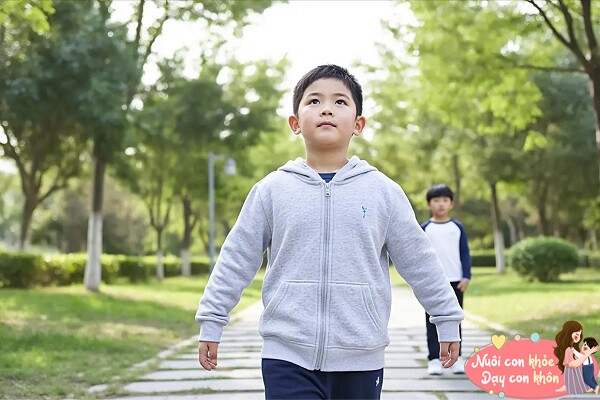The term for this phenomenon is “cheap feelings,” which refers to a child’s sense of low self-worth, susceptibility to influence, and lack of confidence in social relationships.
Research in child developmental psychology has found that children who are overly accommodating to others over a long period tend to develop a “hard-to-refuse” neural pathway in their prefrontal cortex and are three times more likely to develop anxiety disorders as adults. This is especially true for boys.
Here are some suggestions for parents to help boys overcome these “cheap feelings”:


Teach children to set boundaries and be brave enough to say “no”
In reality, some children lack the courage to say ‘no.’
Psychology suggests that this often occurs because children fear conflict and worry about not being accepted if they refuse.
However, true respect comes not just from accommodating others but also from a clear awareness of boundaries, enabling children to protect themselves.
Parents can role-play and simulate various daily scenarios with their children.
For instance, if a classmate asks for help but the child is uncomfortable or unwilling, they should respond in a firm yet polite tone: “I want to help you, but I have other commitments at the moment.”
Through these simulations, children will not panic when they encounter similar situations in real life.
Usually, parents should also seek their child’s opinions frequently and allow them to express their preferences.
It’s essential to tell your child: “Refusing others doesn’t mean losing friends because true friends will respect your decisions.” Gradually, your child will understand that their opinions deserve respect.


Foster courage to escape the predicament of accommodating others
Adler, a renowned psychologist, once said: “All human troubles come from relationships.”
In communication, being overly accommodating can exhaust children and cause them to lose themselves.
Parents can guide their children through real-life stories, such as Neville’s story in Harry Potter. Initially, he was bullied, but he firmly stood up for justice and eventually earned everyone’s respect.
In summary, let your child know that they don’t have to please others; being themselves is enough.
Parents should also make it a habit to praise their children before bedtime. Encourage them to share something wonderful they did during the day. For instance: “Today, I refused to lend my homework to a classmate.”
This helps reinforce their self-esteem and understand that any right decision deserves recognition.


Foster a sense of “nobility” and improve outward appearance
“Cheap feelings” are not just about character; they also reflect one’s external image.
For instance, if a child dresses sloppily, people will subconsciously underestimate them, which can impact their self-perception.
Similarly, when we encounter someone well-dressed at a mall, we often assume they have a pleasant disposition.
Children’s clothes don’t have to be expensive, but they should fit well and be clean. Parents should regularly organize their child’s wardrobe, discarding ill-fitting clothes and replacing them as needed.
It’s also crucial to teach children good manners. They should sit up straight when writing or studying, walk with their heads held high, and maintain a friendly expression when conversing. Additionally, parents should ensure their children maintain personal hygiene by cutting their nails, getting haircuts, and tidying their desks and bags daily.
These small details may seem insignificant, but they help children develop refined habits and improve their overall demeanor.


Foster healthy social relationships and understand the value of giving
Many children associate giving with being loved. However, healthy social interactions should be reciprocal. Among friends, there should be a balance of giving and receiving, not just one party constantly giving while the other takes.
Parents should help children establish exchange principles. For instance, if a classmate frequently borrows school supplies, the child could say: “I can lend you my supplies, but please return them tomorrow.”
This teaches both the child and their peer that their belongings cannot be taken for granted and that relationships are sustained by a balance of giving and receiving.
Parents can also indirectly ask their children: “You’ve helped your friend many times. How has your friend supported you?” This encourages children to observe, think, and evaluate whether their friendships are healthy and equitable.
Of course, it’s essential to teach children that not all friendships are worth investing their sincere emotions in. They should only extend kindness to those who deserve it.


Encourage children to express their genuine thoughts
Most children are reluctant to express their true thoughts for fear of rejection or ridicule.
However, if they continually suppress themselves, they may become timid and feel invisible within their peer group.
When your child faces a problem, refrain from immediately solving it for them. Instead, ask: “How do you want to handle this situation?”
For instance, if a friend takes away their toy, guide them to think and express their viewpoint, ultimately handling the situation as per their preference.
Additionally, teach children to use “I” statements to convey their thoughts, such as “I think…,” “I hope…,” or “I disagree…”
For example: “I think what he did was wrong. I hope he returns my toy.”
Involve your child in family discussions and decisions, such as weekend plans or dinner menus.
Gradually, they’ll internalize the belief that “My voice deserves to be heard”, significantly enhancing their confidence and self-expression skills.
The renowned child psychologist, Piaget, asserted: “A child’s intelligence resides in its bodily movements, and dignity lies in self-assertion.”
As children grow, they can be kind without being weak or susceptible to bullying.
True nobility isn’t about wearing expensive clothes but about embracing the beliefs: “My emotions matter, refusal is reasonable, and my efforts are valuable.”

The Eagle’s Law: Instilling Self-Reliance and Discipline in Your Child
Many parents are perplexed as to why their children are becoming increasingly disrespectful, defiant, and even rebellious as they grow older. “The Eagle Law,” a parenting method that fosters independence while maintaining discipline, is emerging as the key to raising responsible adults who retain respect for their parents.



































